Ministry of Housing & Urban Affairs
MoHUA announces winners of Streets for People and Nurturing Neighbourhoods Challenge
Season 2 of Cycles4Change and Streets for People challenge launched
Posted On:
18 JAN 2022 10:29AM by PIB Delhi
The Ministry of Housing and Urban Affairs (MoHUA) organised an online event wherein it announced eleven winning cities for the Streets for People Challenge, and ten winning cities for the pilot stage of the Nurturing Neighbourhoods Challenge. These cities will now enter the scale up stage of the challenge wherein the projects undertaken in the pilot stage will now be scaled up in a sustainable manner. At the event, the Ministry also launched Season-2 of India Cycles4Change and Streets for People Challenges and a book titled ‘Nurturing Neighburhoods Challenge: Stories from the Field”.
The event was chaired by Shri Manoj Joshi, Secretary, MoHUA. The participants included global and Indian officials from partner organisations who had conducted the challenge, representatives from winning cities, officials from Central and State Governments, including CEOs of 100 Smart Cities.
Announcement of winning cities under Streets4People Challenge Pilot Phase
Since 2020, the Smart Cities Mission (SCM) has been anchoring inter-city challenges to make public spaces more people-friendly. This is in line with the 2006 National Urban Transport Policy, which called for a paradigm shift from car-centric roads to people-centric streets. Over the past 18 months, these challenges vis. Cycles4Change and Streets for People, have transformed into a nationwide movement beyond the 100 Smart Cities.
Under the ‘Streets for people Challenge’, 38 cites piloted re-imaginations of an important street each by prioritizing them for pedestrians. 11 cities have been selected by a jury panel for the next phase of scale up and will be awarded Rs. fifty lakhs each by MoHUA. Four cities were given a special mention by the jury for their efforts during the challenge. The list of winning cities is at Annexure 1. The challenge was conducted with technical support from the Institute for Transportation and Development Policy (ITDP India). For more information on the Streets for People Challenge, please visit https://smartnet.niua.org/indiastreetchallenge/
A second season was also launched for India Cycles4Change and Streets4People challenges. Any city that is not already in the top 11 winners, any smart city, capital of state/UT, or city with over 5 lakhs population can apply.
Under the pilot stage, i.e. stage 1 of the India Cycles4Change & Streets4People Challenges:
- Cities transformed 400+ kms of corridors through temporary solutions to make streets cycling friendly
- Received feedback from 60,000+ citizens through surveys
- Got 600+ Civil Society Organisations to support their cities
- had over 1800 design professionals, students and other organisations coming together to develop and test creative solutions to reclaim streets for people
In the scale up stage, i.e. Stage-2, cities will:
- work towards adopting a progressive Healthy Streets & Parking Policy, creating area level parking plans and start on-street parking management
- Inspired from the Active Mobility Act to safeguard the rights of pedestrians and cyclists, Directorate of Urban Land Transport (DULT), Government of Karnataka has initiated the conversation in Karnataka, which will support the cities and states to work towards adopting such a progressive act.
- Cities will work towards making their interventions permanent and to scale it up across the city
- Cites will work to bring institutional resilience through setting up a Healthy Streets Department.
Announcement of winning cities under Nurturing Neighbourhoods Challenge
MoHUA announced ten winning cities for the Nurturing Neighbourhoods Challenge, in collaboration with the Bernard van Leer Foundation (BvLF) and technical partner World Resources Institute (WRI) India. The Challenge is a 3-year phased initiative aimed at shaping early childhood-friendly neighbourhoods in Indian cities. The list of winning cities is at Annexure 2. Finalists were selected following comprehensive evaluation by a jury of representatives from MoHUA, BvLF, and independent experts in the fields of urban design, early childhood development, and behavioural change.
Following the challenge kick-off in November 2020, over 60 city agencies nationwide responded to an open call for proposals to implement neighbourhood-level pilot projects to enhance the physical and psychological health of infants, toddlers, and their caregivers. Shortlisted by an expert committee in February 2021 based on the strength of their proposals, 25 cities received technical assistance and capacity building over the next 7 months to demonstrate early wins, solicit citizen participation, and build consensus around their projects. In addition to the finalist cities named above, the cohort included Agartala, Coimbatore, Dharamshala, Erode, Hyderabad, Kota, Nagpur, Rajkot, Ranchi, Rohtak, Salem, Surat, Thiruvananthapuram, Tiruppur, and Ujjain.
Under the Nurturing Neighbourhoods Challenge pilot stage, i.e. stage 1, in 7 months, the pioneering cohort of 25 cities has-
- Implemented over 70 pilot projects in neighbourhoods across India. These diverse projects ranged from creation of public spaces in slums, age-appropriate play areas, enhanced outdoor waiting spaces around primary health centres and anganwadis, amenities for caregivers, such as public toilets and nursing cabins, improved streets and junctions, and reclaiming underutilized and residual spaces to create parks and gardens.
- These projects benefitted over 1 lakh children between the ages of 0-5 and more than 1 million people.
- 200+ champions are leading changes on ground, building the movement for young children-friendly cities
In the next scale up stage, i.e. stage 2, the 10 winning cities will receive technical assistance and capacity building to-
- Replicate pilots with learnings and influence development plans, regulations and policies.
- These cities will may to consider setting up a dedicated institutional mechanism to carry this work forward.
Launch of book – ‘Nurturing Neighbourhoods Challenge – Stories from the field’
The booklet has a compilation of projects of all 25 cities that were part of the pilot stage of the Nurturing Neighbourhoods Challenge and can be downloaded from the challenge website. For more information on the Nurturing Neighbourhoods Challenge, please visit https://smartnet.niua.org/nurturing-neighbourhoods-challenge/web/
***
“The pandemic has highlighted the importance of the public realm for public health. Continuous micro movements on a daily basis is what keeps as active, alert and healthy. Citizen should able to get out of their homes and walk to the market, walk to work or nearest metro/bus stop to get to work, cycle for pleasure but also for commuting, not just go out to eateries/restaurants for recreation but be able to picnic at a park or waterfront, take up sports, and breath fresh air. Every citizen should be able to cultivate these daily habits for an active, healthy and happy life. But as government leaders we have to ensure that we are providing the necessary built and natural environment for these.”
“In an emerging paradigm at the Ministry, for the first time we are taking the lens of certain citizen groups to reimagining our cities. In partnership with the Bernard van Leer Foundation, we are investing in cities to nurture early childhood development and to make them work for caregivers. Changes led by the Nurturing Neighbourhoods cohort are transforming how we plan, design, and manage Indian cities to be healthier, more inclusive places for young children to grow up, which consequently enhances quality of life for all.”
- Shri Manoj Joshi, Secretary, Ministry of Housing and Urban Affairs
“As an avid cyclist myself, the last two years have been memorable to see this wave of walking and cycling take over many cities across the country. The ongoing challenge for city leaders under AKAM has also sparked the inspiration across the country with many city leaders talking up walking, cycling and running activities! It is important that the city leaders lead the way and inspire others!”
“Investing in cities that nurture early childhood development and work for caregivers is a new and unique lens for looking at urban development and citizen experience in India. Never before have city engineers in India’s urban local bodies been asked to look at cities from 96 cms above ground- i.e. height of a toddler. Through the Nurturning Neighbourhoods Challenge, Smart Cities, for the first time, are re-imagining their neighbourhoods to work for infants, toddlers and their caregivers. Because of this challenge, we now understand better that access to a safe, supportive public realm during the critical early years of a child’s life is essentially linked with strong long-term social, economic, and developmental outcomes. We look forward to seeing the 10 winning cities announced today become ‘lighthouses’ for this approach, sharing their learning with the rest of the country and others across the world.”
- Shri Kunal Kumar, Mission Director, Smart Cities Mission
“Streets are for people, not just cars. The Open Street Campaign helped over 100 cities across India reimagine their streets. During the challenge, the cities transformed their traffic centric streets into vibrant spaces, filled with colour, music and laughter. Imagine what we can accomplish if these were made permanent!”
- Aswathy Dilip, South Asia Director, Institute for Transportation and Development Policy
“We extend our heartiest congratulations to all the winners and everyone involved in making the Nurturing Neighbourhoods Challenge such a success. It is encouraging to see the excellent quality of innovation and work done by cities keen to build a healthy, safe, and playful environment for babies, toddlers, and their families. From dumpyards and unused spaces being converted into play zones to microparks and well-equipped vaccination centres for young children, the effort put in by cities has been truly commendable. We at BvLF believe that when city leaders plan, design, and manage neighbourhoods from a child’s perspective, they not only make it safe, accessible, and fun for young children, but also support the child’s long-term health and well-being. And, ultimately, cities that work for babies, toddlers, and their caregivers work for everyone.”
- Ms. Rushda Majeed, India Representative, Bernard van Leer Foundation
“It is heartening to see how Indian cities enthusiastically participated to make public spaces, streets and facilities more accessible to infants, toddlers, and their caregivers. We are thankful to the Smart Cities Mission, Ministry of Housing and Urban Affairs for providing cities a platform to ramp up early childhood-friendly interventions and to the Bernard van Leer Foundation for their support in making this work possible. I congratulate the 10 Nurturing Neighbourhoods finalists and others who strove for change on ground. Making our cities more walkable and accessible, with a focus on the most vulnerable, is critical to shaping a resilient, low-carbon and liveable future.
- Dr. O.P. Agarwal, CEO, WRI India
Annexure 1
The Top 11 Awardees of the pilot stage of the Streets4People Challenge, in alphabetical order, are:
- AURANGABAD for building early consensus with all public agencies and other stakeholders
- BENGALURU for creating public spaces in residential area with involvement of RWA
- GURUGRAM for Pedestrianizing markets and school zones by involving the citizens
- KOCHI for integrating multiple ongoing initiatives to transform a neighborhood
- KOHIMA for transforming parking into vibrant community spaces
- NAGPUR for re-imagining busy market streets into pedestrian havens
- PIMPRI CHINCHWAD for creating a city-wide strategy for healthy streets
- PUNE for activating dead spaces and making them experience zones
- UDAIPUR for transforming the transit experience
- UJJAIN for making giant leaps towards permanent pedestrianization
- VIJAYAWADA for involving the community at every step
4 cities have been recognized as the Jury Special Mention, and the cities are:
- IMPHAL for creating vibrant streets through street museums
- KARNAL for bringing art to the streets and in dead spaces of the city
- SILVASSA for displaying innovation in materials
- VADODARA for inclusive and innovative design solutions by using recycled materials
-
|
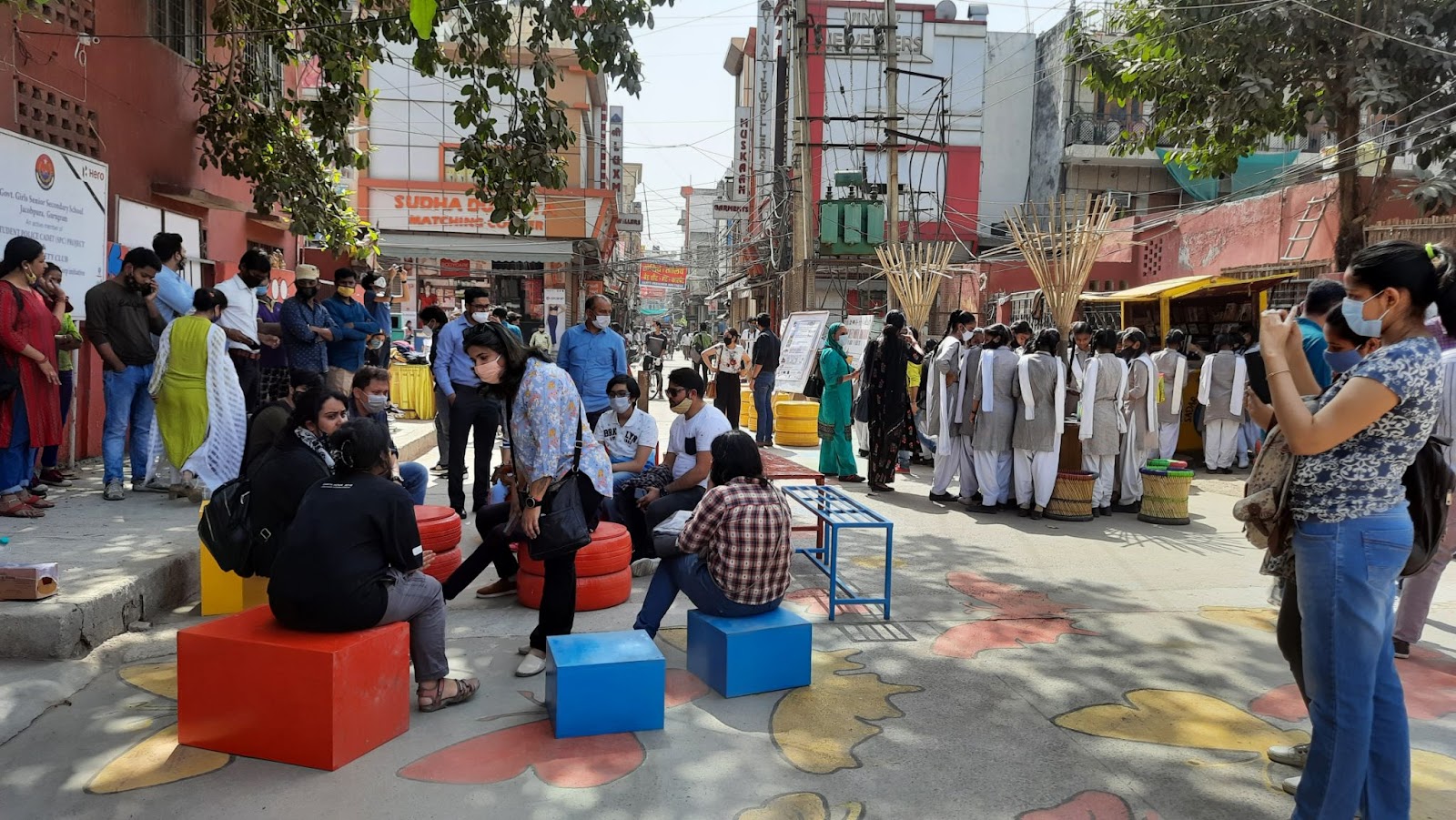
School Zone along Jacobpura Road in Gurugram | Photo credit: Gurugram Municipal Corporation
|
|
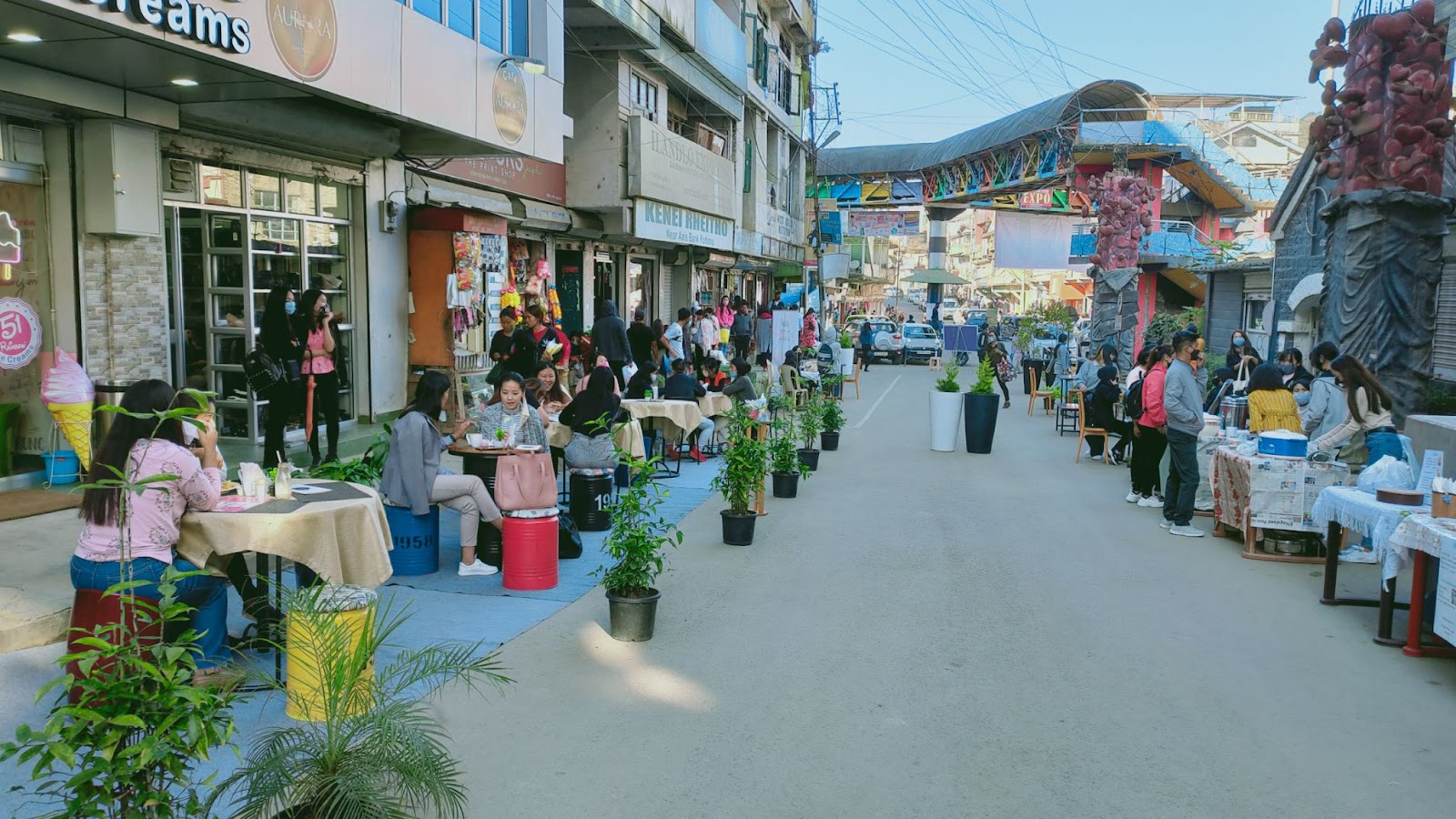
Mokokchung Road in Kohima | Photo credit: Kohima Smart City Ltd.
|
|
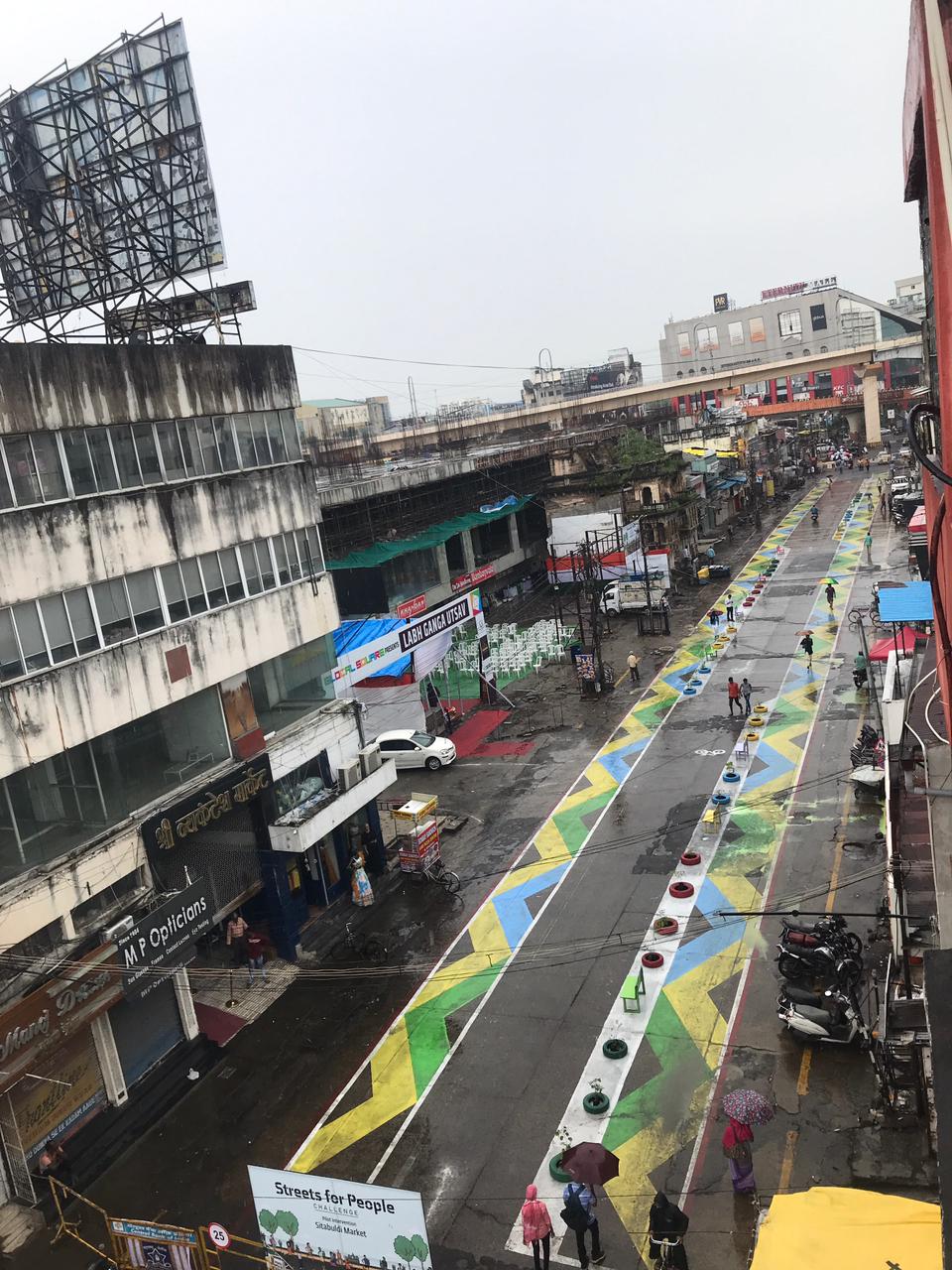
Sitaburdi Market in Nagpur | Photo credit: Nagpur Smart City Ltd.
|
|

Pahari Bus Stand at Chetak Circle in Udaipur | Photo credit: Udaipur Smart City Ltd.
|
Annexure 2
Top 10 Awardees of pilot stage of the Nurturing Neighbourhoods Challenge, with some highlights, in alphabetical order, are:
- BENGALURU enhanced the safety of an anganwadi to foster independence in toddlers, refurbishing common areas, toilets, and play spaces with child-specific design standards.
- HUBBALLI-DHARWAD introduced a shared pram service and priority seating on 100 Bus Rapid Transit buses, improving the public transport experience for pregnant women and caregivers.
- INDORE provided a neighbourhood park previously inaccessible to young children and revamping it with lighting, plants, and recycled and natural materials.
- JABALPUR pioneered a child-friendly public vaccination centre, with outdoor play area and waiting space for caregivers and young children, lactation rooms, and ramps for universal accessibility.
- KAKINADA converted underutilized street space into a protected pedestrian plaza and toddler play zone in the heart of the city, accessible to nearby informal settlements.
- KOCHI converted dilapidated residual areas around anganwadis into safe, shaded public spaces for women to gather and young children to play.
- KOHIMA transformed a roadside garbage dump into a green, community-funded micropark and adapted a schoolyard into a multipurpose public space for young children and caregivers.
- ROURKELA created formal play spaces in informal settlements and introduced lactation booths in public spaces for the convenience of nursing mothers.
- VADODARA introduced a mobile play van to set temporary play areas for children living in areas lacking such opportunities and reclaimed play space from under a flyover for an adjoining anganwadi.
- WARANGAL improved play spaces in an anganwadi and provided safer access to it by enhancing pedestrian infrastructure along streets and junctions in the area.
|
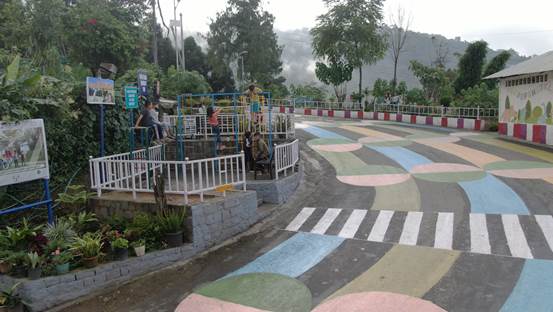
Forest Colony public pocket park in Kohima | Photo credit: Kohima Smart City Development Ltd.
|
|
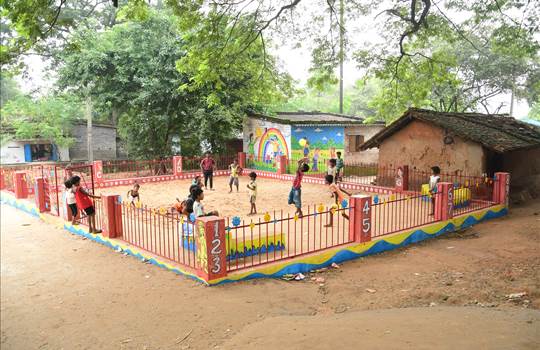
Play spaces in Malgodam and Leprosy Colony slums, Rourkela | Photo credit: Rourkela Smart City Ltd.
|
|
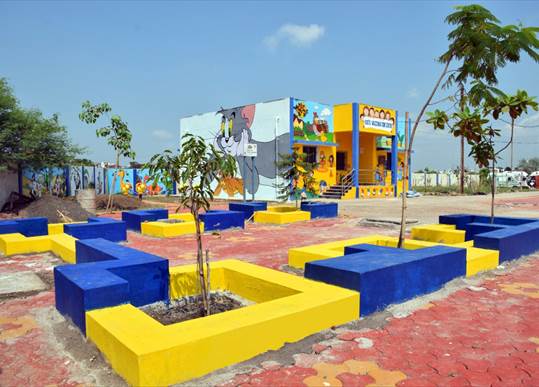
Kids vaccination centre at Manmohan Nagar, Jabalpur | Photo credit: Jabalpur Smart City Ltd.
|
|
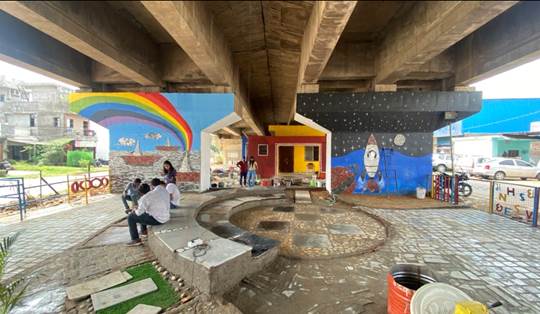
Anganwadi under Vadsar flyover, Vadodara | Photo credit: Vadodara Smart City & SMAID University
|
YB
******
(Release ID: 1790637)
Visitor Counter : 4433